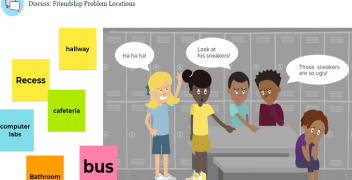Preventing Aggression in Schools Everyday: Friendship Voyagers & Friendship Explorers
Preventing Aggression in Schools Everyday (PRAISE) is classroom-based problem-solving, aggression, and bullying prevention program. The program was developed in partnership with Philadelphia elementary school students and their teachers, parents, and community members to be scientifically grounded, developmentally appropriate, and culturally relatable for students attending schools in urban environments. It began as a universal adaptation of the CHOP-developed Friend to Friend program given teacher feedback that all children in a classroom, not just selected small groups of children, would benefit from learning the skills. When PRAISE was first developed in 2005, it was a 20 session program led by CHOP facilitators in partnership with classroom teachers. In 2019, PRAISE was shortened and adapted to become led by school counselors and teachers, with training and coaching from the CHOP team.
PRAISE aims to:
- Promote social and emotional skills development
- Improve children's friendship skills and problem-solving abilities
- Decrease children’s levels of aggressive behavior, including relational (gossiping, rumors, social exclusion), physical (hitting, pushing), and cyber (using electronic means) forms of the behaviors with a strong focus on reducing reactive aggression
- Support a productive and positive classroom teaching environment
PRAISE includes:
- Friendship Explorers, a curriculum for 1st-2nd graders
- Friendship Voyagers, a curriculum for 3rd-5th graders










